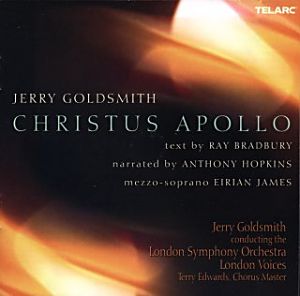Curio Corner
Jerry GOLDSMITH
Christus Apollo
text by Ray Bradbury (plus Music for Orchestra) Anthony Hopkins (narrator); Eirian James(mezzo-soprano)
London Voices London Symphony Orchestra conducted by Jerry Goldsmith
TELARC CD-80560 [51:21]

This disc presents three of Jerry Goldsmith conducting three of his rare forays into concert music on a no-expenses spare release with the London Symphony Orchestra, London Voices and Anthony Hopkins.
Music for Orchestra dates from 1970 and was a commission from Leonard Slatkin for a short piece for the St. Louis SO. As Goldsmith notes, "While I was thrilled with the commission, the year was not a good one for me. I was going through a divorce and my mother was seriously ill with cancer. All my personal turmoil - pain, anger and sorrow - went into writing "Music for Orchestra…" A 12-tone work, Goldsmith continues to say that "I do think the style is almost anachronistic. But for me thirty years ago, it was a liberating way to express my deepest feelings." The eight-minute piece is certainly stark and violent, though to a follower of the composer's film music it evokes nothing so much as a condensation of the sensibilities which drove his brilliant score for Planet of the Apes (1968). As such, while not likely to have been heard before by most people who will buy this disc, the music is hardly unfamiliar.
The disc ends with a much more recent piece, Fireworks, written in 1999 for the finale of the composer's first series of concerts with the LA Philharmonic at the Hollywood Bowl. Goldsmith, who has lived in LA all his life, says, "I decided to make the piece a grand celebration of my childhood, growing years, years of maturity, and all the events which climaxed with my appearance at the Hollywood Bowl. " In this way the music moves from the darkness of the album's opening work to a grand extrovert carnival much more in keeping with Goldsmith's heroic film scores. Again eight minutes long, it balances the disc with elegance.
Between these two bookends is the centrepiece of the disc. The cantata Christus Apollo, a work in four movements in this recording playing for 34 minutes. The work is scored for orchestra, choir, mezzo-soprano - here Eirian James - and narrator - Anthony Hopkins. Again a 12-tone work, the music dates from a 1969 commission by the California Chamber Symphony to set a text by Ray Bradbury. Goldsmith records that his working relationship with the author dated back to 1950's radio; and 1969 was not only the year of the first Apollo landing on the moon, but of the film of Bradbury's Illustrated Man, for which Goldsmith wrote the score.
The Apollo programme of course took its name from Greek mythology, and here Bradbury uses Apollo in both its ancient and modern meanings, drawing also upon a humanist interpretation of Christianity to cast a - highly fashionable in New Age California in both the 1960's and today - fable of Man assuming the fire of the gods (or God) and becoming akin to Christ. The lengthy text - over four pages in the booklet - shows some of the poetic flair of the writer's fine short stories, though ultimately degenerates into pretentiousness, and depending on point of view, blasphemy, heresy or romantic wish-fulfilment nonsense. Hopkins delivers the spoken passages with his expected gravitas while James presents the cosmic text with a committed intense seriousness.
This is music filled with the ambition of a year in which America placed a man on the moon, but rather than the heroic tonalities of modern post-Star Wars space adventure, Goldsmith adopts a tone of mystery, of vast cosmological forces infinitely beyond the reach of humankind. If it is the year of Apollo it is also the year after 2001: A Space Odyssey, and it must be noted Goldsmith's friend and mentor Alex North originally scored that movie, before Kubrick replaced the composer's music with selections from the classics. Indeed, in the 1990's Goldsmith finally brought North's score to disc for the first time. As such there is irony in the fact that Goldsmith's Christus Apollo sounds much less influenced by North than it does by the choral music of Ligeti which featured in 2001. In the richly orchestrated yet distant, alien textures there is also something of the poetry of Scriabin. How else could one score such a space opera?
The recorded sound is excellent. It should be, having been recorded for SACD and mixed down for this CD version. Goldsmith obtains explosive and intense performances from the LSO - so different to his recent tired disc of film themes (Goldsmith Conducts Goldsmith) from the Philharmonia - and London Voices are sharply honed. It has taken 30 years for this music to come to disc - some of us have been waiting for it since reading an interview with the composer in the late lamented Films and Filming back in the 1970's when he talked about it at some length - and is probably only realised now due to the increasing popularity of film music and the prospect of crossover fertilisation between the film music and classical markets. Of course the album was actually recorded in 2001, and might yet be dubbed, 2002: A Space Oddity as arriving now in the new millennium it sounds oddly dated. As the composer remarks, the form is almost anachronistic. The text is perhaps more so. As a document of a specific time when America really did look about to boldly go where no man had gone before it is a notable piece of work. The atmospheres summoned by the music are still powerful and should find favour with followers of Goldsmith's more demanding film scores. Just listen to the work as a totality and try to ignore the implications of the text. It works much better that way.
Gary S. Dalkin

Return to Index